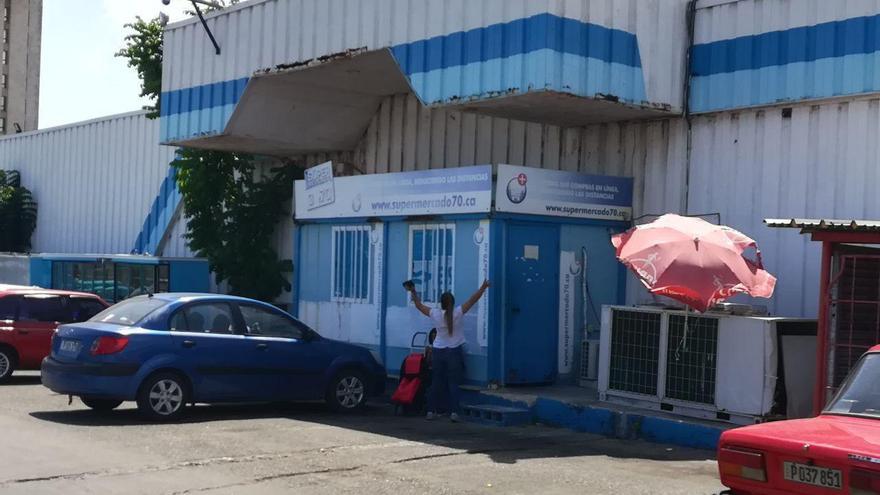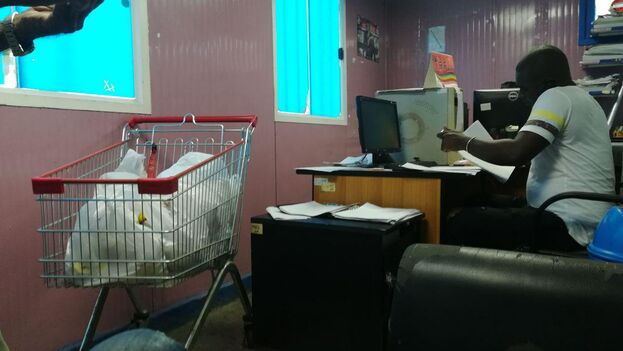
![]() 14ymedio, Marcelo Hernandez, Havana, 27 May 2019 — Under the sun, last Friday, dozens of people waited to enter the 3rd and 70th market in Havana and buy the two packages of chicken allowed per customer. Off to one side of the building, in a small office, those who arrive carry away several kilograms of the product, without rationing, because the transaction occurred via the internet, thanks to an emigrated relative living abroad.
14ymedio, Marcelo Hernandez, Havana, 27 May 2019 — Under the sun, last Friday, dozens of people waited to enter the 3rd and 70th market in Havana and buy the two packages of chicken allowed per customer. Off to one side of the building, in a small office, those who arrive carry away several kilograms of the product, without rationing, because the transaction occurred via the internet, thanks to an emigrated relative living abroad.
On May 10, the Minister of Internal Trade, Betsy Díaz Velázquez, officially announced the application of measures to regulate the sale of food, personal grooming and cleaning products to avoid hoarding. The measure also includes hard currency markets which, since their creation more than two decades ago, had been marked by unrationed sales.
However, the restriction does not affect the offers of virtual stores, a topic that is not mentioned in the island’s official press, but that has ended up defining the economic status of thousands of families who receive help from emigrated relatives.
The air-conditioned container fills with people in the mornings. Customers arrive with an order number and hope that the food, purchased online through a virtual store by a relative abroad, will be available.
The premise of egalitarianism on which the regime was based ended in the 1990s, when the dollarization of the economy and self-employment began to create strong inequalities. The economic gap has continued to widen since then and those who have access to hard currency and who receive remittances from abroad have greater purchasing power. Now the digital universe is worsening the inequality.
Many Cubans do not look kindly on the fact that access to better food depends on the type of currency that is carried in your pocket. State employees and retirees, who receive a salary only in Cuban pesos, reject the harsh monetary reality of the island as discriminatory.
“This can not be, because I have come with the money from my salary to buy food and they only sell me two packages of chicken thighs,” complains Raydel Frías, a young engineer who tells 14ymedio that he had to wait for four hours.
“It’s not right that they ration the amount of chicken, hot dogs and other products here, but if someone buys on the internet there are no limits and they can buy everything they can afford,” insists Frias, annoyed. “That indicates that our money is worth nothing compared to dollars or euros.”
His opinion echoes those of other clients waiting in line. “Last week I received a package my sister, who lives in Atlanta, bought for me and I got five packages of chicken breasts,” he explains to this newspaper. “She also bought me four bags of milk powder online and, although it was almost twice the price, at least she could find it.”

“This ultimately leads to discomfort and inequalities. Why not also ration the amount of products sold online, so that we do not have to see these contrasts between those of us who work and stand in line and those who have relatives abroad?” questions a pensioner who lives only on his pension, equivalent to about 25 CUC (roughly the same in dollars).
In the online purchase, as a general rule, from the moment the relative places the order through the web page and the moment in which the order is picked up or delivered in Cuba, it takes between 12 and 20 days. Buyers can choose between having the products delivered, for which there is an additional charge, or free pickup at the store. Now, the shortages have lengthened the delivery times and the order can take up to a month to reach the hands of the recipient.
Distribution problems not only have to do with the scarce availability of merchandise, but also with fuel restrictions that have reduced the number of vehicles available to deliver the food to homes. “We have only two cars assigned to home deliveries in all municipalities of the capital,” laments one of the employees of the local annex to 3rd and 70th.
“When the product finally arrives, we notify the client by phone and we arrive at his house after 10:00 in the morning and before 3:00 in the afternoon,” explains the worker, who preferred anonymity. “We are very close to the line to enter the butcher shop and people protest because they see others leaving here with their hands full and they only get two packages of chicken.”
“There is a new form of inequality here that has to do with what kind of money you have and where you have it,” says a woman who is waiting in line. “I could have a wallet full of bills and they only let me buy two packages of chicken [parts], but a Cuban who has just arrived in Miami with $50 can send five complete chickens to his family, without limitations.”
On average, the 3rd and 70th shopping dispatch office receives about 60 orders purchased through the internet per day, says one employee. There are times when there are peaks of up to a hundred orders, but their dispatch capacity only lets them fill just over 30 requests on average. When they exceed 40 they have to work overtime.
“For three months the work in this place hasn’t stopped because many people are asking their relatives to buy on the Internet what they can not get in the markets here,” explains the worker. “We have seen double the amount of deliveries we have to manage each day and that has brought us delays and many complaints from customers,” he acknowledges.
“Of course, these complaints are not like those heard in the line outside,” says the woman. “People here are uncomfortable because their product is delayed but they know it will come, but in the market next door they can be waiting all day to buy something and not get it,” she says.
_____________________
The 14ymedio team is committed to serious journalism that reflects the reality of deep Cuba. Thank you for joining us on this long road. We invite you to continue supporting us, but this time by becoming a member of 14ymedio. Together we can continue to transform journalism in Cuba.
